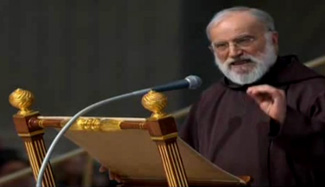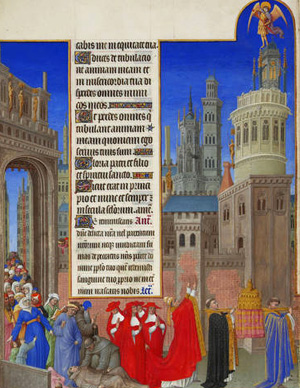 |
A Column of Catholic Orientation
‘Natural Disasters Are Never a
Punishment from God’
Marian T. Horvat, Ph.D.
My friend Jan was confused after reading the Good Friday sermon delivered by papal preacher Fr. Raneiro Cantalamessa in St. Peter’s Basilica. At the end of the sermon on God’s charity, he made a reference to the recent tsunami in Japan: “Earthquakes, hurricanes and other disasters that hit guilty and innocent alike are never a punishment from God. To say otherwise means offending God and man.”
This was a shock to Jan, who had learned in the “old teaching” of the Church that the chastisements of God are, in fact, a charity. God chastises us in this life for our good: to stop us from sinning and to convert us so we escape eternal punishment. “It is most merciful of the Lord not to let iniquity pass unpunished,” said St. Augustine.

Fr. Cantalamessa at his sermon before the Pope |
By “old teaching,” Jan meant the pre-Vatican II catechism. Since the Council, we have been bombarded with a new teaching on an unconditionally merciful God who loves and saves everyone, regardless of the atrocity of their sins or the false religion (or non-religion) they profess (or do not profess). The Good Friday sermon was particularly shocking, Jan commented to me, because the words were said in front of the Benedict XVI, who listened complacently giving them his tacit approval.
“How could he be silent?,” Jan wondered aloud to me. “Doesn’t he believe that earthquakes depend on the will of God, and that He sends them because man has abandoned his law and merits such chastisement?”
She is right. Punishment is drawn down upon man by his sins. But it is also a grace, an important grace, since it serves to save him from eternal destruction. God deals mercifully with the sinner when he sends tribulation to invite him to open his eyes to his miserable condition and to return to the favor of God. This is what anyone can deduce from the teaching of St. Peter (2 Pet 2:5-9).
In fact, it would seem that this teaching would never be as timely and needed as it is today, when all the nations have turned their backs on the Law of God and society is corrupt to its very core.
Instead, the Capuchin papal preacher completely turned around this constant teaching of the Church. To say that a chastisement cannot come down from Heaven because it would “offend God and man” is to go against Scripture and Church tradition, as well as the teaching of past Popes, Church Fathers and Saints.
The penitential processions
In times of plague, earthquake, famine and other hardships, it was common for the clergy – and often even Popes – to hold a penitential procession, with chanting of litanies invoking God and the Saints asking for relief. The medieval Church instituted Rogation days, four days specially set aside for prayer and fasting to appease God's anger at man's transgressions and to ask protection in calamities such as plagues, floods, famines and other natural disasters. The Major Rogation was set on March 25 to commemorate the famous penitential procession of Pope St. Gregory the Great through the city of Rome when a plague was devastating the city in 590.

St. Michael appears and signals an end to the plague |
St. Gregory addressed the people of Rome, exhorting them to penance to avert the chastisement of God. Then, the whole population of Rome joined in the penitential procession through the ruins of the deserted city.
Contrary to the teaching of the papal preacher, God was not offended at the Pope’s prayer to avert the hand of His Divine Justice. Instead, He showed his pleasure by sending a great miracle. As St. Gregory, heading the penitents and bearing a picture of Our Lady painted by the Apostle Luke, reached the bridge on the way to St. Peters, a heavenly vision greeted the eyes of the people. St. Michael descended over Hadrian’s Mausoleum and placed a flaming sword in its sheath – a sign that the plague had been stayed.
Later that mausoleum received the name San Angelo in memory of the miracle and was transformed into a papal palace. Over the chapel on its summit is the bronze figure that still stands today of the Archangel, his wings outstretched, sheathing his sword. Some historians propose the penitential procession of 590 and that great miracle can be regarded as the beginning of Rome’s Middle Ages. (1)
Of course that penitential procession led by a Pontiff and followed by his people was not at all offensive to God and man. Rather, for centuries it was officially commemorated by the Church on the Great Rogation Day. Future Popes, Bishops and priests followed the example of St. Gregory the Great, and when calamity struck or a natural disaster threatened, penitential processions were held to avert the punishment of God against unrepentant sinners.
It seems to me that instead of preaching the falsity that 'God never sends natural disasters’ to punish man for his grievous sins, the papal preacher would do better to exhort the Pope to follow the example of his predecessor St. Gregory and call the entire world to abandon its sinful life.
Contradicting Fatima
The words of the papal preacher are also contradicted by the message of the Mother of God to an errant world at Fatima. There she confirmed Church teaching, telling us that war was a punishment from God for sins.
In the first prophecy of Fatima, the children were shown a terrifying vision of Hell and were told "that is where poor sinners go." Then the three children were told that the war which was taking place – World War I – would soon end. But Our Lady warned: “If the people do not cease offending God, a worse one will break out during the reign of Pius XI.”
She continued, "When you see a night illumined by an unknown light, know that this is the great sign given you by God that He is going to punish the world for its crimes, by means of war, famine and persecutions of the Church and the Holy Father.” Clearly, Our Lady was teaching us that God does punish the sins of man. Sadly, her warning was not heeded, and in 1939 a second and worse war fell upon an unrepentant West. It was Our Lady herself who came to warn mankind that God would punish man for his sins unless measures were taken.
In view of this, one cannot help but wonder why an official papal preacher and Benedict XVI himself can fall so far from the clear tradition of the Church on the chastisements sent by God.
1. To read the complete text of P. Raniero Cantalamessa in Italian, click here; in English, click here
2. Ferdinand Gregorovius, History of the city of Rome in the Middle Ages, Volume 2 (London: George Bell and Sons, 1902), pp. 31-35

Posted on May 20, 2011

Related Topics of Interest
 New Orleans Archbishop: 'Katrina Was a Chastisement from God' New Orleans Archbishop: 'Katrina Was a Chastisement from God'
 More Earthquakes and Tsunamis More Earthquakes and Tsunamis
 But It's Not a Chastisement... But It's Not a Chastisement...
 A Mounting AIDS Pandemic A Mounting AIDS Pandemic
 The Tears of Our Lady and the Punishment of Katrina The Tears of Our Lady and the Punishment of Katrina
 The Japan Tsunami & the Chastisement of God The Japan Tsunami & the Chastisement of God
 What Has Been Forgotten in Haiti? What Has Been Forgotten in Haiti?

Related Works of Interest
|
Talks with Jan | Religious | Home | Books | CDs | Search | Contact Us | Donate

© 2002-
Tradition in Action, Inc. All Rights Reserved
|
 |
|